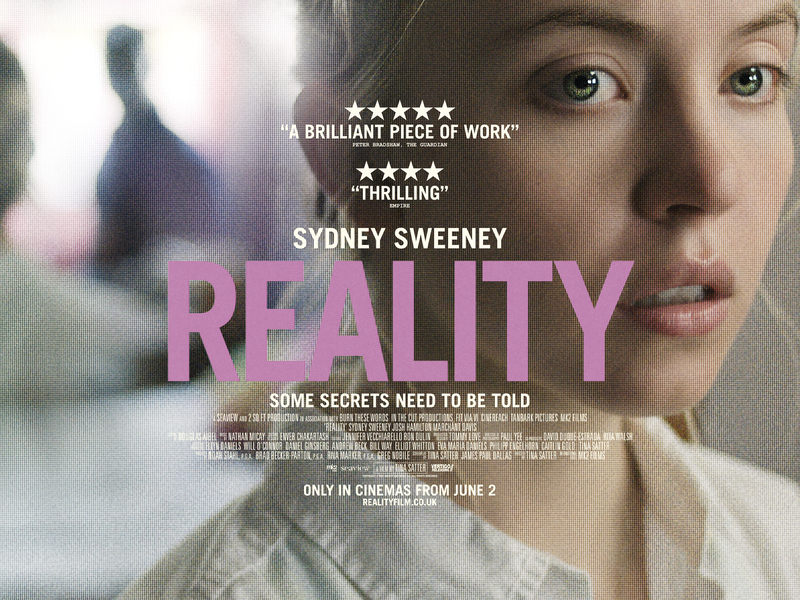
Review by
Eric Hillis
Directed by: Tina Satter
Starring: Sydney Sweeney, Josh Hamilton, Marchánt Davis

When questioned about the motivations for his particular brand of
thriller filmmaking, Alfred Hitchcock would routinely trot out his stock
anecdote about how his father arranged for him to spend a few minutes
locked in a police cell as a young boy. Hitchcock claims the experience,
intended by his father to scare him into good behaviour, gave him a
lifelong fear of authority, which he repeatedly channelled into his work
throughout his career. You probably don't need your parents to have
subjected you to such an extreme life lesson to develop a fear or
distrust of authorities today; simply reading the news is enough to make
you question the motivations of the powers-that-be and your chances of
finding yourself on the wrong end of the law. At time of writing, the UK
government has introduced new laws aimed at stamping out dissent in the
form of protest, the sort of draconian measures the western world likes
to frown upon when it comes to the likes of Russia, Iran or China.
There's an increasing feeling that law enforcement agencies no longer
exist to protect and serve the public, but to protect and serve the
authorities. Simply stressing an opinion is now enough to have you
interrogated in many parts of the so-called democratic west.

Adapting her play 'Is This a Room' as her feature directorial debut
reality, Tina Satter takes our fear of authority figures and
strips it down to its basics. It features a young woman being questioned
by a pair of FBI agents, and it's so tense and uncomfortable you can
feel your skin crawling as the interrogated party is gradually broken
down by a pair of men whose job is to disarm people into confessing
their "crimes." It would be called a brilliant piece of writing, except
all of the film's dialogue is taken directly from an FBI transcript of a
real life interrogation. Sometimes reality really is more dramatic than
fiction.
Ironically, the title actually refers to its protagonist, Reality
Winner (yes, that is her real name), an NSA translator who found herself
confronted by a pair of FBI agents at her home on June 3rd, 2017. A few
weeks earlier Winner had printed out a confidential NSA report detailing
how Russian hackers had employed an email phishing scam in an attempt to
gain information on local election officials in the US. She posted the
report to the online news website The Intercept, but her actions were
discovered before the site could publish the story, leading to her
arrest and subsequent imprisonment in 2018.

Winner is played here by Sydney Sweeney, stripped of her usual
glamorous trappings but not in that over the top way attractive
actresses adopt when they feel it's time to be considered worthy of
awards (no fake nose here). The drama plays out in something close to
real time, and Satter has made the wise choice not to skip to the
interrogation itself but to allow us to soak up the awkwardness of
agents Garrick (Josh Hamilton) and Taylor (Marchánt Davis)
making small talk with Winner as they wait for fellow agents to clear
her house (Winner admits to possessing a small arsenal of weapons,
including the controversial AR-15 assault rifle) and secure her dog and
cat. Far from the men in black stereotype of FBI agents we're accustomed
to in fiction, Garrick and Taylor are dressed like unhip dads at a
neighbourhood barbecue. There's no good cop, bad cop routine; rather
both men present an affable front, placing a decidedly neoliberal boot
on Winner's throat. They talk about their own pets and commend Winner on
her various skills, from her fluency in Middle Eastern languages to her
bench pressing. Whenever Winner makes a witty comment (as we so often do
when we find ourselves in very serious situations), it disarms her
accusers, who react like automatons confronted with something they
haven't been programmed to react to.
Moving to an empty back room in Winner's home, things begin to get more
sinister. The sparsity of the location calls to mind interrogation
chambers in Guantanamo, and there's immediately something off about two
burly men interrogating a young woman with no female law enforcement
representatives present. Garrick takes the lead, assuring Winner that
she's speaking on a voluntary basis, and constantly asking if she would
like some water or if she needs to use the bathroom. However, he never
advises Winner that she may wish to have a lawyer present.

Sweeney is excellent in what are essentially dual roles: that of Winner
and of the role of wide-eyed innocent Winner adopts before she's backed
into a corner and forced to confess. At one point the agents remark to
one another that she doesn't seem to understand why they're here, so
good is Winner at playing dumb. Hamilton is intensely creepy as the
smooth-talking Garrick, presenting an avuncular front but picking up on
every little detail of Winner's testimony in order to entrap her
further. Throughout the interrogation, Garrick claims he empathises with
Winner's motivations, and you can't help but surmise he may well be
telling the truth. He probably has no love of the regime he currently
finds himself working under, but to him it's simply a job. Regardless of
which side of the political fence you're chained to, anyone who believes
in democracy and the public's right to know as much as the people they
vote into power when it comes to important issues will empathise with
Winner's actions, naïve though they might have been in execution. That
men like Garrick are happy to sit on the political fence and be a tool
of oppression is the film's most disturbing takeaway.


